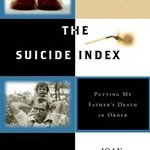
“In the airport, coming home from vacation, he stops at a kiosk and buys grapefruits, which he arranges to have sent to his daughters. They will stumble over the crates waiting on their porches, when they get home from his funeral.â€
Thus opens this stark and haunting memoir, written in prose that surrounded me like clear clean water.
If the best books tell truth the best, then this memoir climbs to the top of the pile SUICIDE INDEX doesn’t necessarily tell universal truths, or even grand lofty truths, it tells the intense truth of Joan Wickersham’s experience of her family, and through her generous helping of genuineness—with no moments where this reader felt she was being fed anything shined up for the audience—the author gifts us with a read that is so present, so authentic, that I felt as though I walked beside Wickersham on her painful journey.
SUICIDE INDEX has no villains. It has no heroes (except perhaps for the mostly off-stage father of the suicide—dead long before the act takes place.) Chapters are presented as an index; a conceit of objectivity, which allows Wickersham distance to delve as honestly while taking nothing from the reader:
Suicide:
act of
attempt to imagine, 1—4
bare-bones account, 5—6
immediate aftermath, 7—34
In this before and after story of a well-loved father, the author attempts to make sense of his final act. It is also the story of Wickersham’s bristling and uneasy relationship with her mother.
The story of her father’s suicide is presented bluntly:
Wickersham’s father makes coffee.
He leaves the usual morning cup for his wife, the author’s mother.
He goes into his study and puts a gun to his mouth.
He leaves no note.
Wickersham searches for clues: Was it a brain tumor? Money owed from a sour business deal? His long-hidden depression? Did the mix of his abusive father’s emotional and physical violence and his own perceived and real failures finally form a poison strong enough to eat away at the protective lining (wife, daughters, grandson, brother, etc.) which should have precluded suicide as an option?
The twisted love Wickersham’s mother has for her husband—her vocal struggle with his never successful, and in the end tragically unsuccessful, attempts at business victory, at odds with her love and loyalty—is presented as fact, never as blame. The reader watches in horror as Wickersham’s father repeatedly tries to please his hypercritical wife. He rarely does. Even after his death she resents his stumbling. In the section labeled Suicide: life summarized in an attempt to illuminate, the author writes:
After he died, when we learned that the gun malfunctioned lightly—it put a bullet into his brain but did not fire with enough force to blow his head apart as might have been expected—my mother said, “Jesus Christ, he couldn’t even do that right.â€
Joan Wickersham didn’t find the definitive answer to why her father killed himself. In the end no note was found, no secret unearthed that could explain his actions enough for the author to say, ‘oh, so that’s what happened,’ but she does a spectacular job of taking us with her on a journey not dissimilar to one most of us must take. Perhaps, like Wickersham, we try to learn why good parents killed themselves, or we question why parents couldn’t take care of themselves or us, some of us need to know how violence became such a constant visitor in our home. Or why we were neglected. But in the end, if we are lucky, we, like Wickersham, shape our past into something we can hold in our hand and our memory, and from which we can learn some measure of distance, despite how it pulls us back. Even with tragedy behind us, we learn to live with the dissonant rhythm of building our lives forward; even knowing our past always burrows inside.
(Having had the great good luck of reading an advance copy of Joan Wickersham’s  wonderful new book, The News from Spain, I was driven to re-post this essay about my love of her last book.)